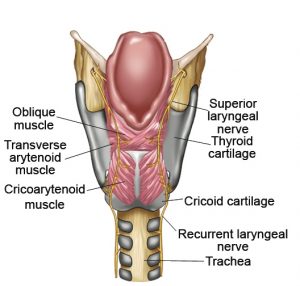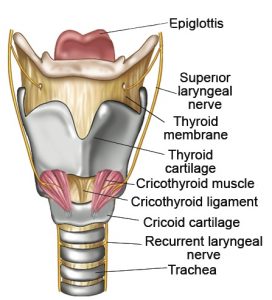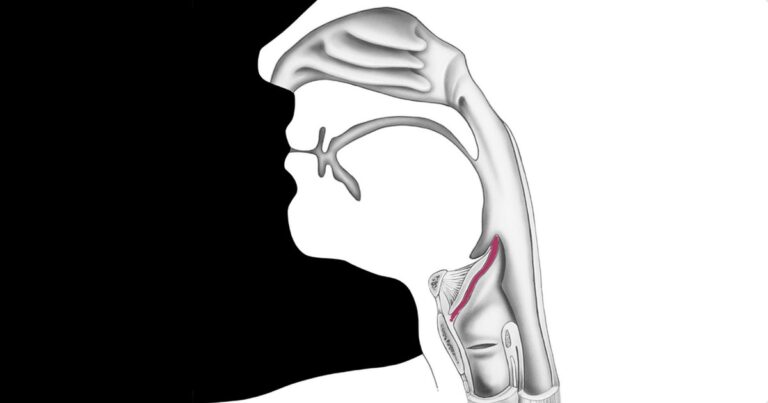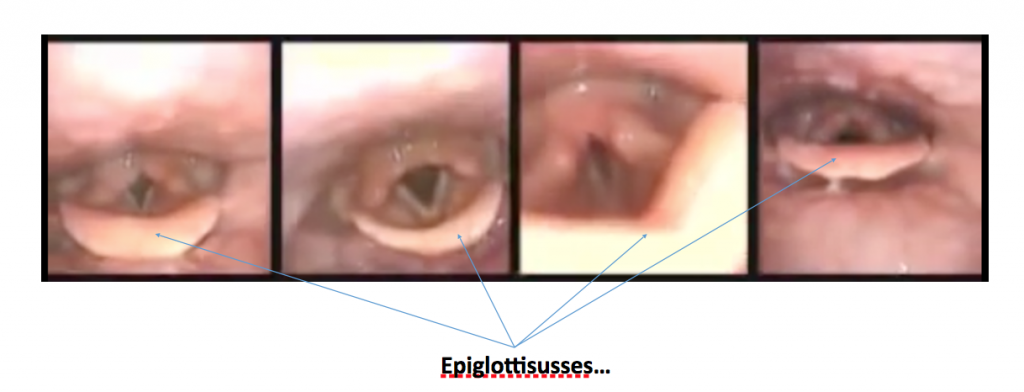What is the epiglottis?
This is a very cool piece of kit that sits at the base of your tongue and essentially keeps you alive!
It’s necessary to write about this incredibly significant part of your anatomy because there is still so much confusion out there about the vocal cords/folds, the larynx itself, and their relationship to our respiratory and digestive systems.

 Essentially the Epiglottis is the first thing we need to talk about because this will decide whether we swallow or whether we breathe – well, we decide, but hopefully you get my point.
Essentially the Epiglottis is the first thing we need to talk about because this will decide whether we swallow or whether we breathe – well, we decide, but hopefully you get my point.
When we swallow, our suprahyoid muscles at the very top of the neck (where the neck meets the jaw) contract and raise the larynx up and allow the Epiglottis to arch downwards posteriorly, and with the assistance of the arytenoid cartilages, which descend anteriorly, seals off our entire airway and facilitates the process of swallowing into our oesophagus (yes, I’m British, we spell it with two “o’s”).
The Epiglottis serves as the first gateway in a triple lock system that protects our airway from any foreign objects from getting down into our lungs – foreign objects being anything that we drink, anything that we eat, pollen and other allergens, viruses and bacteria. This is first and foremost the primary function of our larynx. Not singing, not speaking, but facilitating breathing and protecting our respiratory system.
What else can it do?
Well the Epiglottis can also assist us in narrowing the pharynx (the throat), which can be useful in aiding us in producing high frequency sounds like you’d hear in vocal twang, which is essential for many forms of singing, like Musical Theatre and Gospel, amongst others.
What does this mean to us as teachers and singers?
Well, essentially nothing that we eat or drink is ever going to get near to our vocal cords/folds, nor do we want it to! The Epiglottis makes sure that our airway, and therefore our larynx is completely sealed when we swallow, ensuring that we don’t choke to death or drown.
This means that none of the magical remedies that singers so readily take for their voices have an effect on the vocal cords/folds themselves. So that ginger/lemon/honey tea that you hear about all the time that’s really good for your vocal cords/folds? Yeah, that doesn’t do anything for your voice. I mean, credit where it’s due and all that, ginger purportedly has anti-fungal, anti-bacterial, anti-histamine and anti-inflammatory properties and lemon and honey are supposed to be really good for you too, but you’d probably get a better systemic effect from juicing some ginger root with a small apple and drinking that down, rather than from drinking ginger-tea.
If you’re trying to hydrate your voice, then it’s a good idea to make sure that you’re systemically hydrated. Drinking lots of water as well as eating lots of fruit and vegetables, avoiding too much caffeine and alcohol, and trying to ensure that you “pee pale” is a good start. The second thing you can do is buy a portable nebuliser that creates a cool mist that you can inhale to keep your cords/folds moist.
So, the Epiglottis. Thank your lucky stars that you have one, because it really is brilliant. Oh and fun fact – the Epiglottis comes in all kinds of shapes, some are really curved, some are quite flat and they are rarely completely symmetrical (are any of us really that symmetrical?) so it’s worth getting on to Google or YouTube and checking out some footage.
or epiglottises to be medically accurate. :-)
VIDEOS
Here you will see four singers being scoped whilst they sing. You will see their epiglottises clearly in the images
In this video you will see how the epiglottis closes as food passes the larynx.





